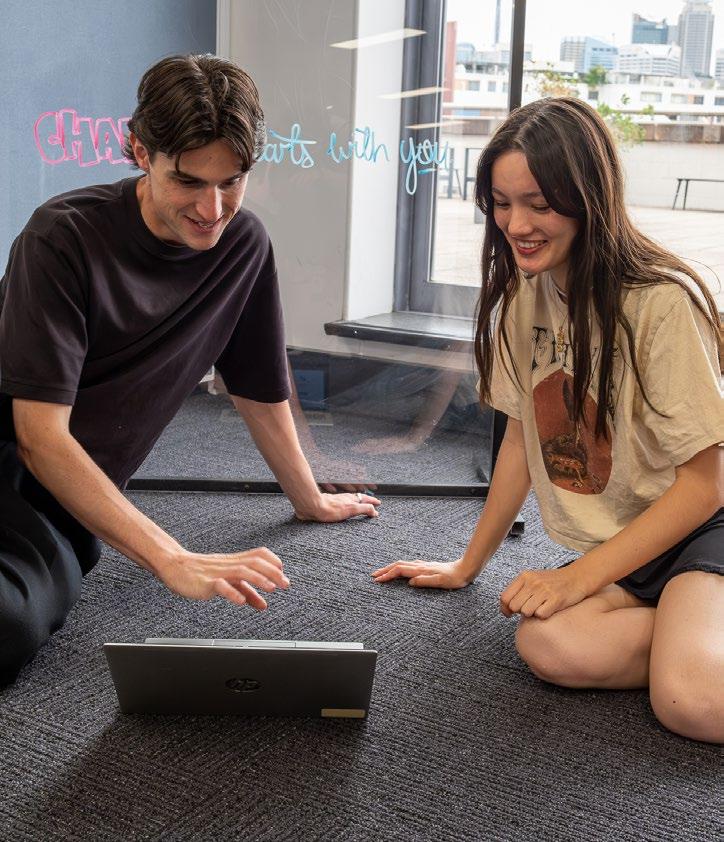ALSO IN THIS ISSUE
UNTIL EVERY GIRL CAN PLAY
Teaming up with Cricket Australia to champion gender equality
A GENERATION ONLINE
Raising youth voices on digital wellbeing
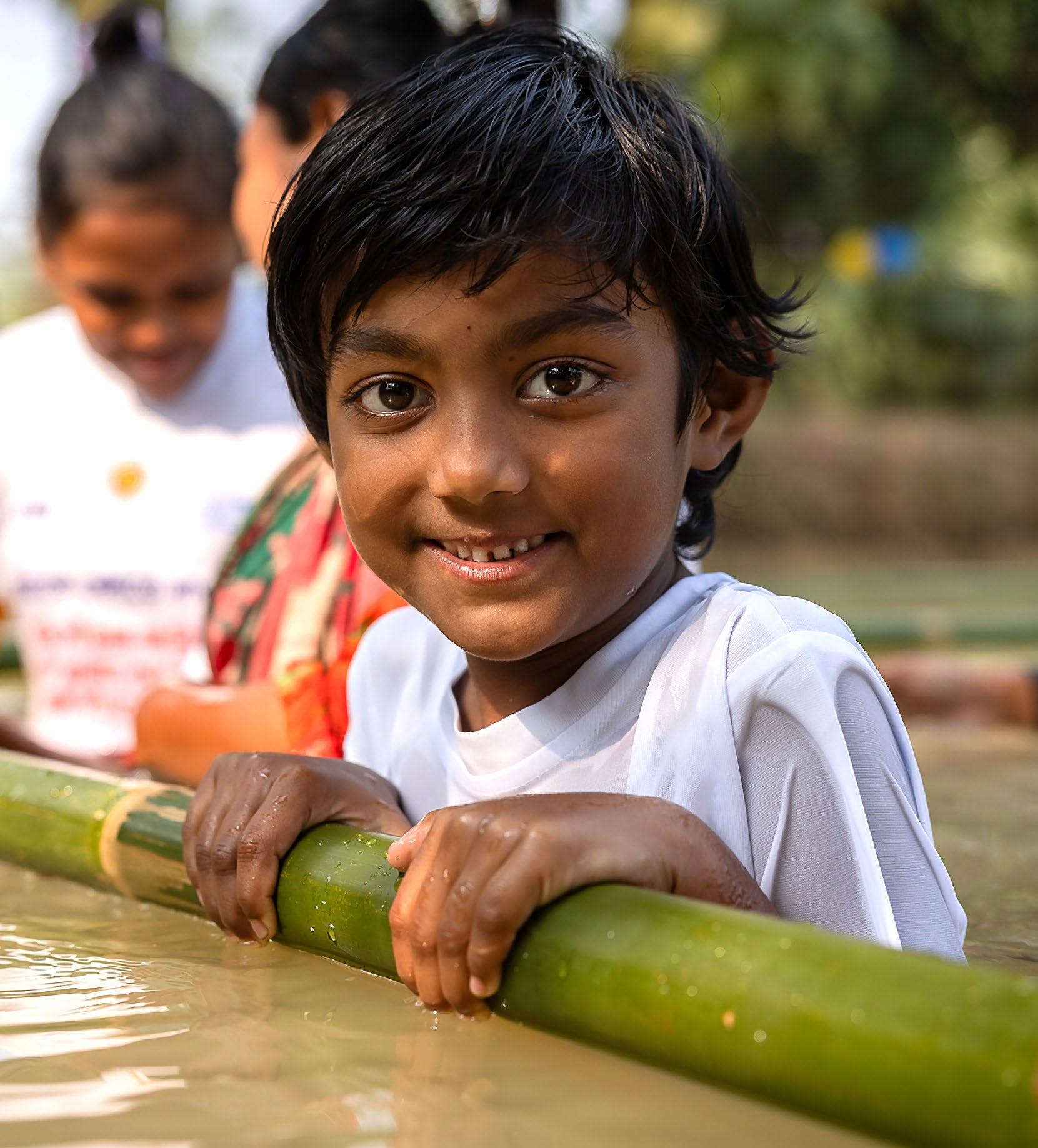


UNTIL EVERY GIRL CAN PLAY
Teaming up with Cricket Australia to champion gender equality
A GENERATION ONLINE
Raising youth voices on digital wellbeing


Our Ambassador’s goal to support children in Bangladesh
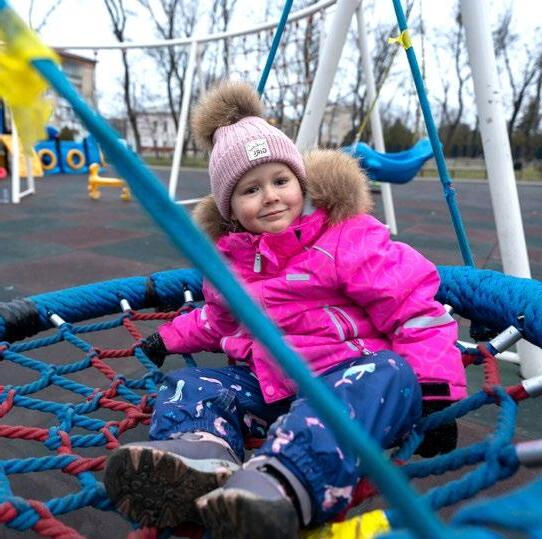
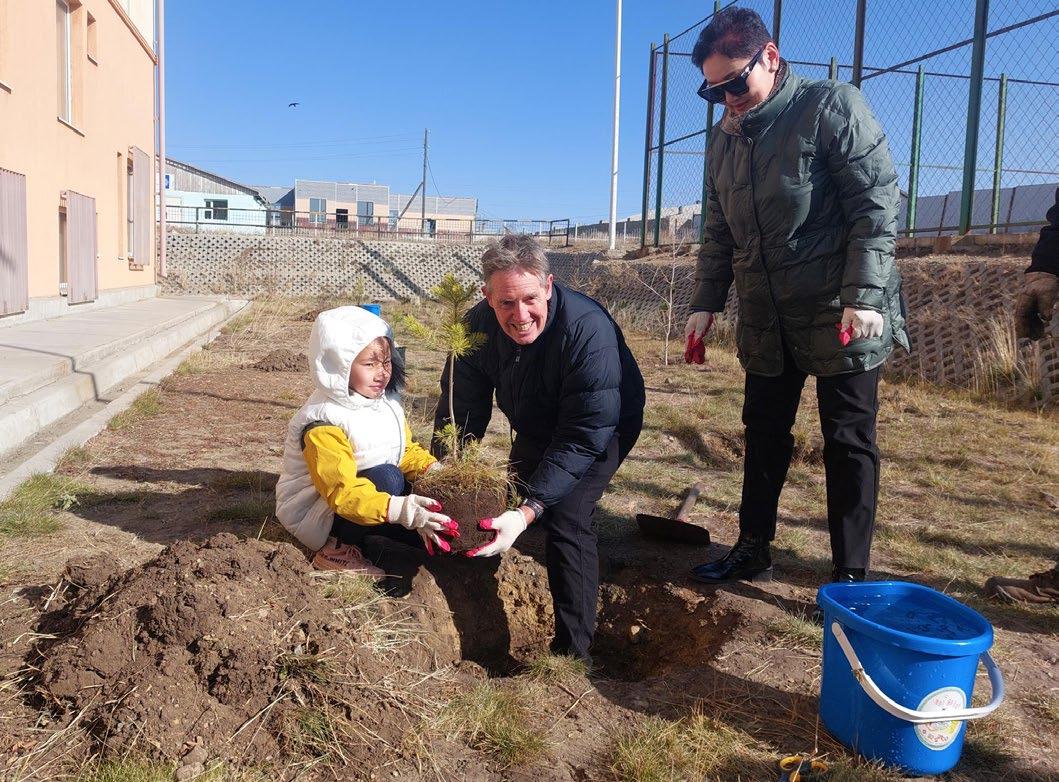
As we enter the second half of 2025, I wanted to take a moment to say a heartfelt thank you for your incredible generosity to children around the world who need us now more than ever.
Last year was one of the worst years on record for children in UNICEF’s history, with more than 1 in 6 children around the world living in areas affected by conflict and war.
But thanks to the support of people like you, we’ve been able to make a difference to children’s lives, whether it’s by helping us reach those affected by unrest in places like Gaza, Ukraine and Sudan, or responding to devastating natural disasters in places like Myanmar and Vanuatu. Together, we’ve been able to reach children and families in emergencies across the globe with crucial support. That includes safe drinking water, lifesaving nutrition and psychosocial support,

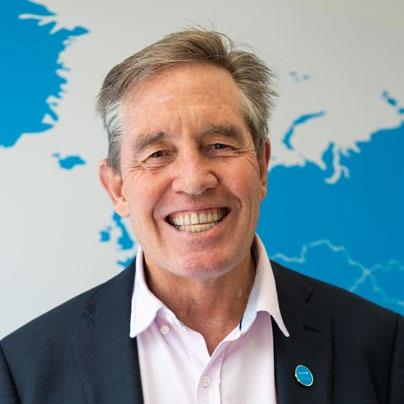
as well as helping communities become more climate resilient to manage future shocks.
I know that these times are challenging for many of us, which makes your ongoing commitment to supporting children even more inspiring. You are more than just donors; you are integral to our commitment to protect children no matter what and for that, we are profoundly grateful.
In this issue, we share some of the ways your support is impacting children’s lives around the world – from emergencies in places like Gaza and Ukraine, to here in Australia through our advocacy work for children’s safety and wellbeing in the online world.
Thank you again for your continued support. I can’t wait to see what we can achieve together in the second half of 2025.
Tony Stuart Chief Executive Officer, UNICEF Australia
and
celebrate the launch of their partnership at the MCG.

On and off the pitch, there are still millions of girls around the world who are facing discrimination and obstacles that are impacting their futures.
Even before a girl is born, gender inequalities shape their lives, becoming even more pronounced in the teenage years, where many girls are unable to complete secondary school due to factors including child and early marriage, pregnancy, and unpaid domestic work.
That’s why UNICEF Australia is incredibly proud to be teaming up with Cricket Australia. The threeyear partnership promotes our Until Every Girl Can Play campaign, raising awareness for girls whose basic rights to education, health, nutrition, and safety are being denied, let alone access to playing sport.
The campaign, supported by our mutual long-term partner Qantas, featured throughout the 2025 summer of cricket, including
at the CommBank Women’s Ashes Day-Night Test at the MCG where the Appeal Appeal turned an iconic cricketing moment into a call for donations in support of gender equality. Whenever a player appealed for a wicket, stadium screens, live TV and radio broadcasts, and social channels lit up with a call for viewers to donate.
UNICEF believes that every child, no matter who they are or where they live, should have a fair chance in life. We are working to achieve gender equality by investing in the early years of a child’s life, keeping every child safe from harm, and empowering teens to reach their potential to thrive now and into the future.
Together, we can continue to make a lasting difference to the lives of girls everywhere – until every girl can play

Sport is a unifying force that can bring about positive change, break down barriers for young girls and women, encourage participation and shift attitudes.
– Rachael Haynes, UNICEF Australia Ambassador and former Australian cricketer.
Thanks to you, we are reaching children with lifesaving support including clean water, nutrition, and medical care. Meet some of the children whose lives you have changed with your generosity.

Two years of violence and displacement have shattered the lives of millions of children in Sudan. Conflict is pushing the country towards famine, with more than 770,000 children estimated to suffer from the most severe form of malnutrition this year.
That includes little Amna (left), who was diagnosed with malnutrition during a UNICEF-supported doorto-door campaign in her village. She was immediately referred to a health facility for treatment, including ready-to-use therapeutic food. “They have given her this food in the packet which she is eating,” said Amna’s mother, Jamila. Thanks to supporters like you that children like Amna can receive the urgent treatment they need to recover from malnutrition.
Five-year-old Zienah is one of millions of children whose education has been disrupted by more than a decade of conflict in Syria. Displacement, widespread destruction, and disease outbreaks caused by the ongoing conflict have been compounded by natural disasters and political instability.
Your generosity has helped Zienah participate in learning sessions at a UNICEF-supported non-formal education centre in rural Damascus. These centres help children like her continue their education in a safe environment and provide stability, restore a sense of normality, and instill hope for a brighter future.

I want to become a dentist when I grow up so I can help treat patients.
– Zienah, 5, Syria
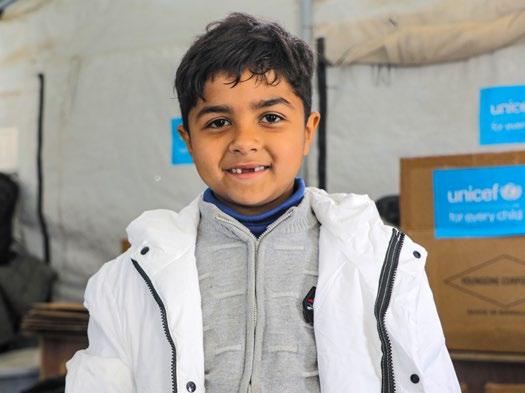
Violence, displacement, disease and hunger are taking a devastating toll on Gaza’s children. Many families are living in makeshift tents and can’t afford the essentials they need to survive.
With your help, UNICEF distributed warm winter clothes to more than 100,000 children including nine-year-old Ahmed, which brought comfort, hope and much-needed relief to those who continue to endure so much.
Despite the ongoing complexities, we screened more than 300,000 children under five for malnutrition between January and April, with more than 1,200 children suffering the most severe form of malnutrition admitted for treatment.

Three-year-old Katya from Ukraine and her mother Alyona have returned to their home in the Kharkiv region after fleeing to Germany at the start of the war. But the local kindergarten remains closed due to the ongoing conflict, so Alyona takes her daughter to UNICEF-supported early childhood education classes.
“She communicates more with other children now, because it’s easier for her to understand them here,” Alyona says. “She’s made her first friends, and she immediately started speaking more at home.”
With your help, UNICEF is working to ensure that children like Katya can get the best possible start in life.
In March, a series of devastating earthquakes killed more than 3,700 people and caused widespread destruction across Myanmar, a country already reeling from years of conflict and unrest. The disaster displaced thousands of children including nine-yearold Mg Zaw, who is living in a temporary shelter with his family as the recovery efforts continue. Since the disaster, UNICEF has reached children with critical support including clean water, hygiene kits, and educational supplies, helping more than 16,000 children like Mg Zaw continue to learn despite the ongoing challenges.
Your generosity means that children can regain their childhoods after their lives were turned upside down by disaster.

Australia’s most decorated Olympian and UNICEF Australia Ambassador Emma McKeon visited Bangladesh to see our work in action.
Bangladesh is a vibrant and beautiful country, but it can also be a challenging place for children to grow up, with poverty, natural disasters, and health crises making daily life a struggle. The country, which is about two-thirds the size of Victoria, is home to more than 170 million people and one of the most densely populated places in the world.
Australia’s most decorated Olympian and UNICEF Australia Ambassador Emma McKeon recently visited Bangladesh with us to see firsthand the life-changing impact UNICEF’s work can have on children’s lives, from swimming skills to education and child protection.
Despite recent improvements, child marriage remains prevalent in

Bangladesh, with more than half of girls married before the age of 18. Through community-led initiatives designed to combat child marriage and family violence, UNICEF is working to mobilise communities to protect women and children – no matter what.
In one of the biggest informal settlements of Dhaka, Korail – which is home to more than 50,000 people –UNICEF Australia Ambassador Emma McKeon participated in community-led activities with girls, including sports for development and discussions around issues like child marriage and child labour.
Despite its own challenges, Bangladesh hosts over 1 million Rohingya refugees, half of them children, who fled Myanmar following the escalation of conflict in 2017.
With over 400,000 school aged Rohingya children living in the world’s largest refugee camp, in Cox’s Bazar, southern Bangladesh, UNICEF and our partners are running a massive education program in the camps, providing training as well as educational supplies.*
Emma met Year 8 Rohingya girls at the camp, who shared their hopes and dreams for the future. Noor said she wants to be a teacher to inspire more girls to continue their education, while Husnama wants to be a lawyer.
As an Olympic swimming champion, one issue unsurprisingly hit close to home for Emma: the heartbreaking number of children who lose their lives to drowning every day. While most Australians learn



The greatest tool a child can have is the ability to swim. Swimming has always been an important part of my life – I learned at a young age, and I believe every child, no matter where they are, deserves the same opportunity I was lucky to have.
– Emma McKeon, UNICEF Australia Ambassador
to swim from a young age, in South Asian countries drowning is one of the leading causes of death among children and adolescents. In floodprone Bangladesh, more than 15,000 children lose their lives every year due to drowning – more than 40 children every day.
During her visit, Emma visited a SwimSafe program where she saw how UNICEF is working with local partners to help children and adolescents learn to swim.
* Sadly, recent international aid funding cuts are putting programs like this at extreme risk.
Emma has set an ambitious goal – to raise $250,000 to fund programs that protect and empower children in Bangladesh. Donate here
TOP Noor and Husnama proudly share what they are learning as part of their Year 8 curriculum in a learning centre supported by UNICEF in Cox’s Bazaar.
BELOW Joya, 12, (left) and Mim, 11, (right) hold up their new goggles with UNICEF Australia Ambassador Emma McKeon at the UNICEFsupported SwimSafe program in Gazipur, Bangladesh.
51%
of girls in Bangladesh are married before the age of 18.
1 in 10
children aged 5-17 are engaged in child labour.
40
children die every day due to drowning in Bangladesh. It’s the second leading cause of death for children under five across the country.
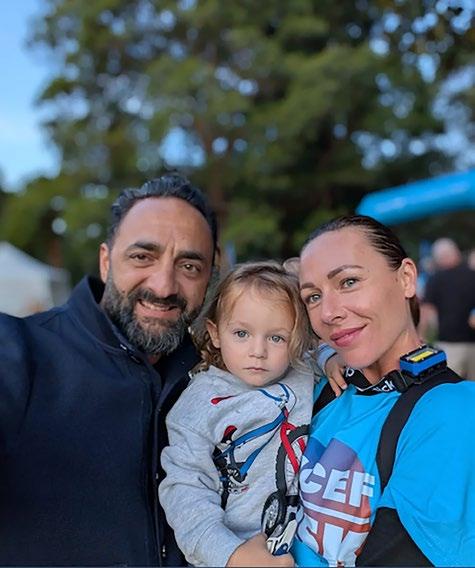
Tamara was one of more than 640 people who participated in UNICEF Australia’s first-ever Dusk to Dawn night walk in November 2024. From sunset to sunrise, dedicated participants walked an incredible 37km through the night from North Sydney to Bondi Beach, stepping up to fundraise for children facing crises around the world. A massive thank you to Tamara and everyone else who got involved.
Raised $4,400
From running challenges to garden parties, there are so many fun ways supporters of all ages are raising money for children.
Ruth from Tasmania hosted a #CookForGaza garden party and invited friends, neighbours, and family members for afternoon tea. “The feature food was creamed rice made with rosewater,” she said. Her daughters brought the rosewater back to Australia from a refugee camp for Palestinians in Lebanon.
Raised $2,250

Tobie and her friends initiated a 100km running challenge to support UNICEF’s work for children in Gaza, raising $1 per kilometre. They quickly had 30 people join the fundraiser. Well done, Tobie!
Raised $2,840
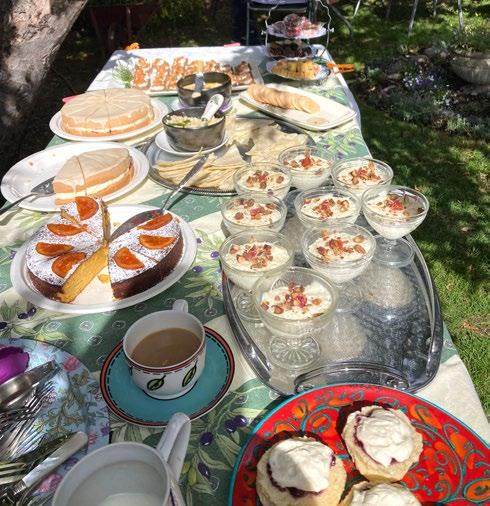

#CookForKids!
Host a lunch, dinner, morning tea or bake sale and raise urgent funds to support children in emergencies around the world. You can choose to support children in a specific emergency like Gaza or choose to direct your donations to where the need is greatest.
After signing up, you’ll receive a digital cookbook, hosting kit, and a fundraising pack to help you get started. Visit cookforkids.unicef.org.au to find out more.
It is a consoling and warming thought that leaving a gift in our Wills could help to support something which lives on beyond our journey, to continue UNICEF’s demanding work of helping children in such difficulties well into the future.
– John Rickard

UNICEF Australia’s long-time supporters, John Rickard and his late wife Julia, made the generous decision to continue supporting children beyond their lifetimes. We spoke to John about why he chose to leave a gift in his Will to UNICEF Australia and how it can make an impact on generations to come.
Tell us a bit about yourselves.
John: Julia and I grew up in Perth. We had supportive upbringings in both public and private schools. We learnt that many people, especially children around the world, are not as lucky as we are here in Australia, and many face a range of challenges. In our school days, there was particular emphasis on Papua New Guinea and the issues faced by its children.
Julia and I met at the University of Western Australia and then, after receiving a scholarship to study mathematics and statistics at the Australian National University, married in Canberra in 1972. We moved to Melbourne in 1977, and I worked in the Victorian public service for over 40 years. Julia was a wonderful support for me during this time and also worked in childcare centres, schools and university libraries. We enjoyed 50 years of a happy and fulfilling marriage before Julia died in 2022.
Why did you choose to leave a gift in your Will to UNICEF Australia?
John: Julia was a very compassionate person with great love for animals and children, though we were unable to have children of our own. She was stunned by the wonderful work UNICEF does around the world for children, especially girls. We made regular donations to UNICEF for many years before deciding to leave bequests in our Wills.
I am, of course, keeping the regular donations going, and the bequest is carefully documented along with about a dozen more for other charities, organisations and universities. Like Julia, I am a great admirer of UNICEF’s work. Children in so many places are in need of enormous support, and their recovery and improvement can leave wonderful legacies for future generations.
If you want to leave a legacy for future generations, you can contact our friendly Gift in Wills team at giftsinwills@unicef.org.au or on 1300 884 233
In Australia, every child will be online by the time they are 12. Here’s what children and young people had to say about how they engage with the online world.
UNICEF Australia strives to help children and young people be safe online, enabling them to benefit from all the opportunities of an increasingly digital world. But as technologies continue to evolve at a rapid pace, they are also creating new risks, particularly for younger users whose lives they are profoundly shaping.
Children’s rights should be at the forefront of regulation concerning digital spaces, children and young people should have as many guarantees of their rights logged onto their devices as they do logged off.
– Chelsea, 18, UNICEF Australia Young Ambassador
While there have been significant changes in Australia recently, including the introduction of a social media ban for young people under 16, those who will be most impacted by these reforms have been missing from the conversation. UNICEF Australia believes children and young people should have a voice on issues that impact them.
Our groundbreaking new research, supported by the Telstra Foundation, shed light on the digital lives of over 2,000 children and young people across Australia, including their interactions with social media, exposure to mis- and disinformation, and managing their online data and privacy.
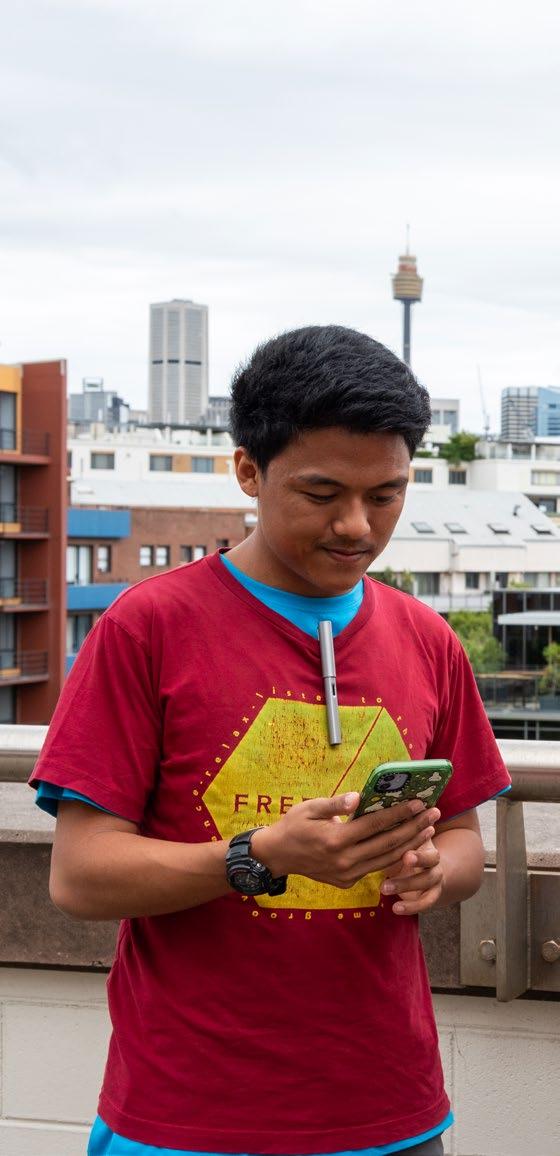

1 FIVE KEY FINDINGS FROM THE REPORT READ THE FULL REPORT HERE: 2 3 4 5
of children and young people always provide a false age online, bypassing age verification mechanisms.
of children and young people believe it’s important to verify information before sharing it online.
of children and young people are uncomfortable with how their data is being collected and used online.
of children and young people believe content shared by popular influencers or content that has a lot of likes and shares.
of children and young people are uncomfortable with their friends sharing pictures or videos of them online without their permission.

Much like the online world itself, the approach to improving digital wellbeing and safety is multifaceted; regardless of how we interact with it, we all have a part in ensuring accountability, protection and safety for children.
– Ashwini, 16, UNICEF Australia Young Ambassador
UNICEF Australia works with decisionmakers and partners to improve outcomes for children and young people across Australia.
1Legislating a duty of care online The Australian Government has committed to legislating a new duty of care that will ensure digital platforms prioritise users’ safety and consider the best interests of children when they are designing and operating services, not just when things go wrong.
2 Improving children’s digital literacy In partnership with e-Smart, an initiative of the Alannah and Madeline Foundation, we developed digital literacy resources that have been accessed by more than 13,000 students around Australia. These resources equip kids aged 10-12 with the skills they need online, including critical thinking and how to spot mis- or disinformation.
3 Enacting a Children’s Online Privacy Code
The Government committed to developing an Australian-first Children’s Online Privacy Code which will hold tech companies accountable, ensuring children’s data is only collected and used in a way that serves their best interests and providing them with the protections they are entitled to. The Code recognises the unique risks that children face online.
CHECK OUT OUR DIGITAL LITERACY RESOURCES HERE:
